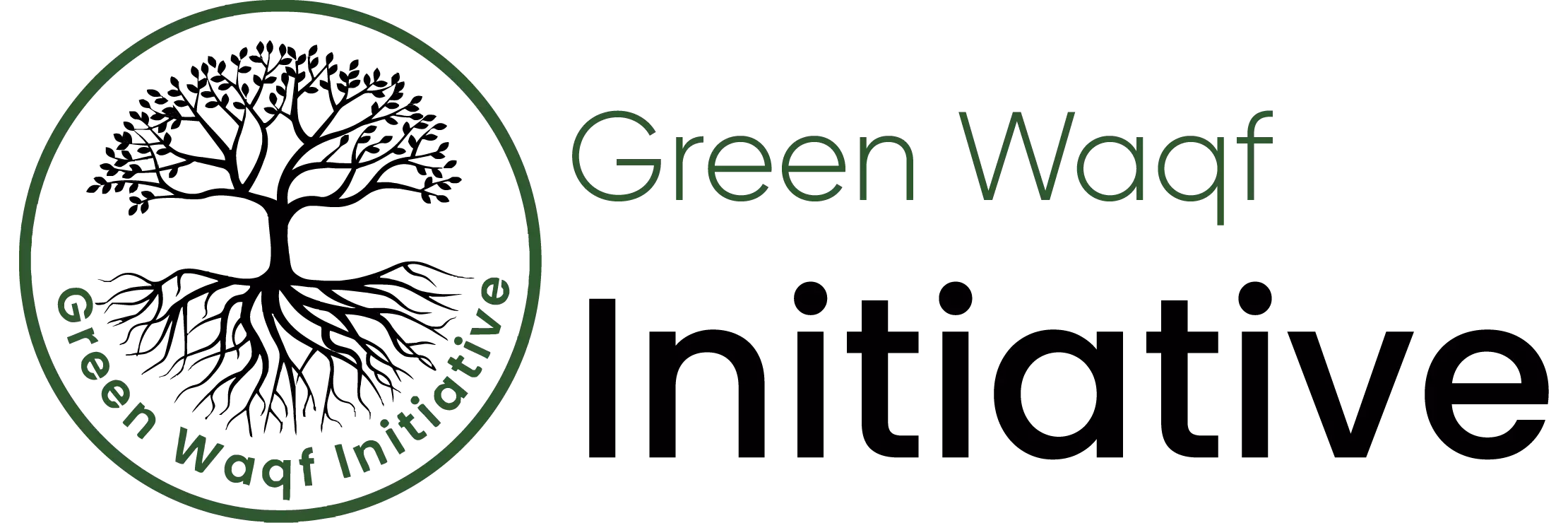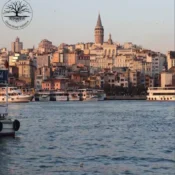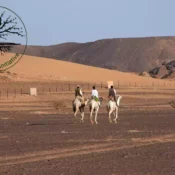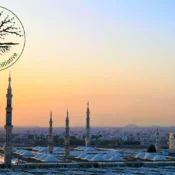
Turkey Environmental Profile
These environmental profiles were produced as part of the Green Waqf Initiative by the
Islamic Chamber of Commerce, Industry and Agriculture (ICCIA). ICCIA believes that
the Islamic concept of Waqf can be used as a social financing mechanism to combat
climate change. Through Waqf, the land is decommodified; therefore, it can be used
only for specific purposes defined by the owner. These purposes can include
reforestation, land revitalization and research centers, among others.
This environmental profile has been developed to assess the ecological situation in
Turkey and is part of a series that covers all ICCIA member countries. These profiles
are meant to be used as a source to assist in policy dialogue, stakeholder engagement,
and strategic planning and to help educate and raise awareness about the social,
cultural and economic risks associated with climate change. The profiles provide
relevant information on pertinent public and private sector policies and programs and
the country's adaptation priorities and potentials.
Turkey Environment Profile Team
Author: Fatima Faisal
Editor: Safia Hussain
Table of Contents
- Turkey Environment Profile
- Trkey Environment Profile Team
- About ICCIA
- About ICCIA
- About the environmental profile
- About the environmental profile
- Section 1: Country Overview
- General overview of Turkey
- Climate Change Risks
- Climate change policies in Turkey
- Intended Nationally Determined Contributions
- Ratified Paris Climate Agreement, 2021
- Green Development Revolution
- Eleventh Development Plan (2019-2023)
- Section 2: Sector-wise climate change causes and effects
- Agriculture
- Tourism
- Conclusion & Recommendations
About ICCIA
The Islamic Chamber of Commerce, Industry, and Agriculture, an institution affiliated with the
Organization of Islamic Corporation (OIC), aims to strengthen collaboration in the fields of trade,
commerce, information technology, banking, insurance, shipping, joint venture, and many others
within member countries.
ICCIA is the sole representative of the private sector in 57 Islamic member countries and primarily
focuses on creating a knowledge platform for the private sector of the Muslim countries to connect
and learn. It provides visibility to the star performers for future growth and access to new markets.
Additionally, it lays out policy recommendations to enable a private-sector-friendly business
environment in policies, processes, paperwork, and payment system integration, to name a few.
Finally, ICCIA plays an integral role in promoting member country products and increasing access
between home and foreign markets.
About the environmental profile
Several experts claim that insufficient climate control policies have become a 'very serious' concern
and have been significantly harming a considerable proportion of the world's population.1 Some top
reasons behind climate change include heat-trapping greenhouse gasses, deforestation, use of heavy
machinery, powering buildings, and cutting down on farming livestock.
ICCIA's recent initiative focuses on promoting environmentally friendly and sustainable practices in
member countries to enhance societal impact, minimize waste, and improve living standards.
Temperatures are expected to increase by 2.5o Celsius in East and Central Turkey and by 1.5o Celsius
in coastal regions by 2050, making Turkey highly susceptible to climate change conditions.
Section 1: Country Overview
General overview of Turkey
Turkey, a massive peninsula, and the bridge that adjoins Europe with Asia, occupies a unique
geographic location. It is covered by the Black Sea, Mediterranean Sea, and Aegean Sea on three
sides and is neighbored by Bulgaria, Greece, Azerbaijan, Armenia, Iran, Georgia, Syria, and Iraq.
Although, most of the country lies in the Asian territory, Turkey shares a fair share of traits with
Europe.
A total boundary length of approximately 4,000 miles (6,440 km) is marine, encompassing coastlines
along the Black Sea, Aegean, and Mediterranean seas and the narrows that connect the Black and
Aegean seas.2 The Turkish straits encompass the Bosporus, the Sea of Marmara, and the Dardanelles;
Turkey's sovereignty of the straits has served as an important element in its ties with other states.
Moreover, Turkey is primarily a mountainous country, with actual lowland areas limited to the
coastline. One-fourth of the land surface is over 4,000 feet (1,200 meters), while fewer than two-fifths
is under 1,500 feet (460 meters). Mountain peaks exceed 7,500 feet (2,300 meters) in several areas,
particularly in the east, where Turkey's tallest mountain, Mount Ararat, reaches 16,945 feet (5,165
meters) along the borders with Armenia and Iran.3
Waqf is a crucial part of Turkey’s land development and law. Unlike other Muslim countries, it is
quite surprising that waqf has survived in Turkey for this long. A variety of causes have contributed
to the Turkish waqf system's survival and revival. The steady erosion of "Kemalist Jacobinism" and
the emergence of democracy, along with capitalist accumulation, are foremost among these.4 Aydn
Bolak, a Member of Parliament, introduced the 1967 law that permitted the waqfs to breathe again.
Although the draft attracted fierce resistance, several members of the parliament were able to secure
waqf rights in the country. The 1967 law (number 903) indicated the use and legislation of waqf in
Turkey stating that no waqf can be established that is opposed to the law or national interests, or that
supports contemporary politics, a specific race, or community, waqfs can be exempted from taxes, the
control of waqf is solely in hands of the General Directorate of Waqfs, and a few other conditions
regarding annual profits, associations, and usage of waqf land.5
Climate change risks
Turkey, like the rest of the world, is dealing with the unpleasant realities of climate change. It had one
of the hottest summers on record in 2021. Scorching heat waves fueled major wildfires in the
country's southwest, affecting five times the amount of territory normally affected during the summer.
Despite the fact that Turkey often has huge water surpluses, some localities encountered shortages
owing to severe drought. Others had severe flooding, killing a large number of people.
The United Nations Intergovernmental Panel on Climate Change (IPCC) predicted stated in its 2021
assessment that Turkey will face three escalating trends: temperature increases, dehydration, and
increasing sea levels.6 As a result, the country is likely to suffer recurrent and severe weather all year
long.
Decreased levels and duration of precipitation is another rising concern in turkey. In October 2021,
Turkey encountered its lowest perception in 20 years raising serious concerns for agricultural
activities and climate change effects. The drop was reported to be 19% when compared to long-term
precipitation levels, and 16% when compared to the same period in 2020. The most extreme drop,
39%, was observed in Southeastern Anatolia, an area already known for its dry climate. Reports show
that precipitation in turkey is expected to fall further by 10% by 2050, severely increasing chances of
droughts and water scarcity in the country.
Here is a visual representation of groundwater storage as of January 11, 2021. Cooler colors indicate
more water, while warmer colors indicate less.7

Here is a comparison of temperatures in Turkey with that of the globe from 1990 – 2010.8

Climate change policies in Turkey
Intended Nationally Determined Contributions
Turkey submitted their Intended Nationally Determined Contribution (INDC) to the United Nations
Framework Convention on Climate Change (UNFCCC) Secretariat in 2015. As a result, it established
a target of at least 21% incremental emission reductions by 2030 relative to the status quo scenario.
According to this calculation using the incremental mitigation approach, Turkey's greenhouse gas
emissions would be decreased by 929 MtCO2e by 2030 as a result of climate action, down from
1,175 MtCO2e in 2030 if no action was adopted. In other words, it would double before decreasing
by 21%. Turkey re-submitted this aim as a National Contribution Declaration in October 2021, after
ratifying the Paris Agreement.9
Ratified Paris Climate Agreement, 2021
Even though Turkey signed the Paris Agreement in 2016, it did not ratify it for five years mainly
because it wanted to register itself as a developing country instead of a developed country in front of
the UN. The Turkish parliament ratified the deal on October 7, 2022, following President Recep Tayyip Erdogan's statement at the United Nations General Assembly that the country would adopt the
Paris Agreement in October and achieve net zero emissions by 2053.10
As the ratification of the agreement ushers in a new era in Turkey's climate policy, it is anticipated to
renew its pledges as a party to the pact. The Paris Agreement aims to enhance the global response to
the threat of climate change by continuing to limit temperature rise to 1.5 degrees Celsius by
halving emissions by 2030 and attaining net zero emissions by 2050.
A variety of changes in Turkey's economic and political situation have prompted this policy
adjustment. To begin, Ankara has moved to better position itself in order to tap expanding climate
money flows, with the World Bank and a number of European development banks promising to offer
climate finance if Turkey adopts the Paris Agreement.
Furthermore, the implementation of the European Union's Fit for 55 legislative packages, which
involves a proposal for a carbon tariff on imports recognized as the Carbon Border Adjustment
Mechanism, has been critical, as it has caused massive problems among the Turkish business
community regarding sectors most vulnerable to tariffs, such as the iron, steel, and aluminum
industries.
Moreover, Turkish public interest played a critical role towards the adaptation of the Paris
Agreement. A recent survey concluded that public sensitivity to climate change is rapidly increasing,
and an increasing number of citizens are demanding more work towards climate policies.
Green Development Revolution
The Green Development Revolution, declared by Erdogan following the ratification of the Paris
Agreement, intended to improve Turkey's international image by advertising initiatives such as tree
planting and recycling.11 The Green Development Revolution, with goals such as zero waste, net zero
carbon, and green energy, will assist Turkey in leading an effective inclusive development of a living
and sustainable environment for future generations. The Green Development Revolution, as well as
Turkey's inclusive and humanitarian development outlook, indicate that the country would assist
victims of global climate change. Additionally, it will also demonstrate its opposition against injustice
and inequality caused by climate change, just as it does against terrorism and all forms of
discrimination.
Eleventh Development Plan (2019-2023)
Turkey's Eleventh Development Plan (2019-23) highlighted the country's commitment to a "green
transformation" that would necessitate significant economic and social changes. The National Green
Building Certificate System is one such step, which is in actuality part of a larger attempt to construct
"green cities."
Section 2: Sector-wise climate change causes and effects
Agriculture
Agriculture is a significant industry in Turkey. It contributes greatly to Turkey’s overall GDP and
influences its economy extensively. 35%, 28%, and 26% of the country is covered by agricultural
fields, rangelands, and forests, respectively. Only in the flat lowlands is soil structure dense and
productive, and soils prone to erosion cover up to 80% of the land area. Turkey is expected to suffer
significant agricultural production losses as a result of global climate change. The majority of
research associate climate change with decreases in maize yields, one of the country's key crops.
The following graph shows climate change and its impacts on the yield of selected crops and milk
production in Turkey.12
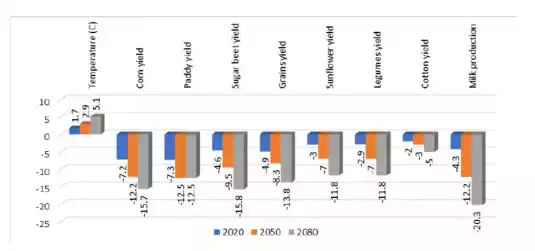
Agriculture is Turkey's largest water user, accounting for 74% of total consumption. Climate change
is projected to have the greatest impact on agriculture. The increasing use of poor irrigation systems
is regarded as a major contributor to the expected future water shortages.
Tourism
Tourism contributes 10.4% of world GDP and 10% of global employment, making it one of the most
important economic sectors. Climate is a determinant in travel time, tourist activity type, destination, and duration of stay.13 Climatic characteristics are especially essential in climate-sensitive and
climate-dependent tourism activities that necessitate precise weather conditions.
Turkey is the fourth most visited tourist destination in the Mediterranean. Tourism accounts for 11%
of GDP. Despite its various cultural and historic attractions, beach vacations on Turkey's
Mediterranean (Aegean and Turkish Riviera) and Black Sea shores are the most popular. Climate
change may have a negative impact on Turkey's tourism industry due to rising temperatures. Rising
average temperatures in the Mediterranean, combined with an increase in the likelihood of heatwaves,
may result in temperatures surpassing tolerable levels more regularly in the future. The number of
days with temperatures above 40°C is expected to grow significantly in the region by 2030.14 Other
issues include water scarcity, which limits the functioning of tourist facilities (such as swimming
pools and golf courses), and an increase in the risk of forest fires in several locations. Most
importantly, Malaria's return to the southern Mediterranean region cannot be ruled out.
Conclusion & Recommendations
There is no doubt that Turkey suffers from extreme weather conditions and is highly prone to climate
change effects. Although, parliamentary and governmental effects to combat climate change are
visible in many instances and areas, one can argue that the limited policies implemented and
proposed are not enough. If Turkey aspires to develop further and retain its position as a tourism hub,
green governance is highly essential.
It is also crucial to realize that policy proposals alone will not do much good unless they are
implemented, and positive results are yielded.
